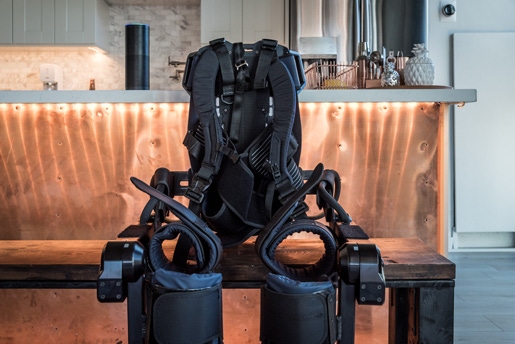Two futuristic technologies combine in the form of an Amazon Echo/Alexa voice-controlled robotic exoskeleton from Bionik Laboratories.
August 8, 2017

Marie Thibault
Bionik Laboratories Corp's ARKE exoskeleton, in clinical development, has been integrated with voice control.
It may seem like the stuff of sci-fi movies, but patients with mobility impairments can now direct their exoskeletons to stand, sit, walk, and more using just their voices.
Bionik Laboratories Corp., the makers of the ARKE lower body exoskeleton, have added the capabilities of Amazon's Echo and Alexa Voice Service to the robotic device. The ARKE exoskeleton is in clinical development and is intended for patients with neurological and mobility challenges as a rehabilitative and assistive technology.
Michal Prywata, cofounder, chief operating officer, and director of Bionik Laboratories, told MD+DI that the idea for the integration was borne from an expectation of a greater future need for intelligent, easy-to-use assistive technologies.
"There is a trend in healthcare to move patients from expensive healthcare systems to their homes. A lot of these people will be severely disabled and will need robust assistive technologies to be mobile in their homes," Prywata said. "These types of devices will require a lot of training and effort at first for the user, so we thought it would be a great idea to implement Echo to help, because we know Echo will also continue to improve."
The integration means that ARKE users will be able to stand up simply by saying "Alexa, I'm ready to stand." The technology gives users power over about 50 different voice commands. Besides being able to sit, stand, and walk, users can switch over to manual mode and use voice control to change their stride length.
|
The integration gives users the ability to operate the ARKE exoskeleton using voice commands. |
"The commands would be similar to how you use Alexa to turn on lights or listen to music," Prywata explained. "An action item is needed--'Alexa, stand me up,' or 'Alexa, stop walking'--in the same way you'd say 'Alexa, turn on the lights.'" He added that more voice commands will be offered over time as clinical testing uncovers more useful functionalities.
The integration was achieved using Amazon's API development kit and by ensuring Bionik Laboratories' servers communicate with Amazon's servers. Prywata explained that the company will next work directly with Amazon to confirm that the development is thorough and reliable.
"We can't have any possibility of a wrong command since we're dealing with people's lives," he pointed out.
Earlier this summer, Bionik Laboratories partnered with Wistron Corporation to develop a consumer-type exoskeleton intended for use in the home at a lower price. According to a press release, this home-use exoskeleton would ideally be financeable, costing the user less than the current cost of care for a mobility-impaired patient.
"Aside from the large number of citizens who have suffered injury, the global population is also aging rapidly, and those citizens will be in need of a home-based assistive product that can truly provide them the mobility that a wheelchair, cane, or crutches currently can't," Peter Bloch, CEO and chairman of the board of Bionik Laboratories, said in a press release. "We will continue to seek out partnerships and technological advancements that will enable us to serve that population on a mass consumer scale."
Marie Thibault is the managing editor at MD+DI. Reach her at [email protected] and on Twitter @MedTechMarie.
[Images courtesy of BIONIK LABORATORIES CORP.]
You May Also Like



